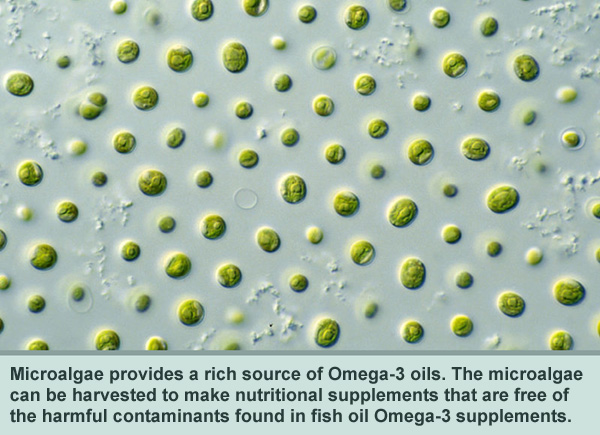A 12-week randomized controlled trial has shown that healthy individuals consuming a microalga-based Omega-3 supplement can achieve significant drops in cholesterol levels.
The study, published June 2020 in Nutrients, reported a 25% drop in very-low-density lipoprotein (VLDL) and a 3% drop in total cholesterol (TC) level.
Omega−3 fatty acids, also called Omega-3 oils, are defined by Wikipedia as “polyunsaturated fatty acids characterized by the presence of a double bond three atoms away from the terminal methyl group in their chemical structure.”
Are plant sources just as potent?
Omega-3s are widely distributed in nature, and play an important role in the human diet and in human physiology. Because of their critical nutritional role, nutritional supplements containing Omega-3 oils have grown in popularity during the past two decades.
The new research was sponsored by a manufacturer of Omega-3 oils; however, it was a double-blind, randomized, placebo-controlled study. Such studies are the industry standard for research and are commonly referred to as “RCT trials.”
The trial was conducted by researchers at the University of Sydney and the University of Queensland in Australia.
The study comes at a critical time in the debate over the best food sources for creating Omega-3 supplements.
Traditionally, animal sources (primarily fish oils) have been used for creating Omega-3 supplements; however, in recent years manufacturers of plant-sourced products have marketed their products as the healthier option.
Plant-sourced Omega-3 oils are usually chosen for their superior safety—avoiding the toxins typically found in fish oils—while detractors say they don’t carry the same level of health benefits.
Advocates of plant-sourced products, however, say well-formulated plant products can be just as effective—and this study supports that claim.
Study details
To conduct the study researchers recruited 120 healthy volunteers to participate for a period of 12 weeks.
The experiment group took one Omega-3 capsule at breakfast, while the control group took a placebo.
With the findings of the trial showing cholesterol-lowering benefits, researchers explained the benefits were achieved because the Omega-3 supplementation had improved liver function.
The improvements in liver function meant that a lower amount of triglyiceride was produced and transported from the liver to the muscle and fat tissues. This in turn decreases VLDL and TC levels.
It is worth noting that this study concentrated on just one of the three types of Omega-3 oils—eicosapentaenoic acid, or EPA. The capsules used for the study included 250mg of EPA derived from microalgae.
Cardiovascular benefits
Researchers stated: “The benefits of long-chain Omega-3 fatty acids for cardiovascular health are primarily built upon mixtures of docosahexaenoic (DHA) and eicosapentaenoic acids (EPA).
“Highly purified EPA therapy has proven to be particularly effective in the treatment of cardiovascular disease, but less is known about the benefits of EPA-only supplementation for the general healthy population.”
For a toxin-free, pure, plant-sourced Omega-3 supplement, check out Optimal E.F.A. offered by Optimal Health Systems.
– – –
Source: Nutrients (MDPI.com).


